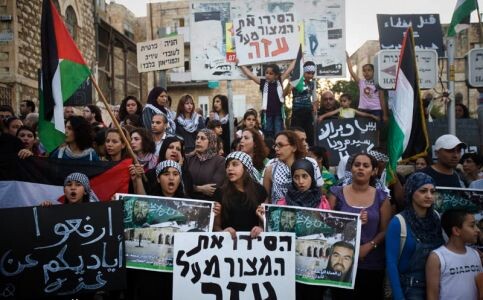The Electronic Intifada Kfor Qara 8 June 2010

Palestinians in Haifa demonstrate in protest of Israel’s attacks on the Gaza Freedom Flotilla, 1 June 2010. (Oren Ziv/ActiveStills)
During the Israeli attack on the Mavi Marmara, deep in international waters, I was inside the body of the ship. We were unarmed civilians ranging in age from a one-year-old child to an 88-year-old priest. We were going to Gaza to break the siege that Israel has imposed on a million-and-a-half people for the last four years. We were carrying a cargo of humanitarian and construction aid as well as letters from Turkish children to the children of Gaza. We were full of hope. When the attack began at 4am on 31 May 2010, our ship was transformed into a military target. On the deck, at first there was heavy firing, and then the Israeli occupation’s commandos took control of the ship.
Minutes after the attack began, wounded and corpses were being brought inside from the deck. We were then held for several hours with four bodies and dozens of wounded, some in critical condition. Blood was pouring from the bodies of the dead and the injured. We wanted to help them, but we had no medical equipment to treat them. There was nothing we could do. One Turkish woman was crying and saying goodbye to the body of her dead husband, petting his face and reading the Quran over him. Another man had a bullet wound in his head and was dying.
From 5am on, we were begging the Israeli navy to provide medical assistance to the wounded and dying but received no response. We made the request in English and Hebrew through the loudspeaker and also wrote a sign in Hebrew reading, “SOS … people dying in need of immediate medical attention” and put it on the window in front of them. They ordered the people with the sign to get lost.
At around 7am they ordered us to come to the exit door one by one. I requested in Hebrew that medics be allowed to stay with the wounded; a solider told me to shut my mouth. Later he called me, “You, tell the wounded that if they want to stay alive, they should come out one by one.” We tried to bring the injured out individually, but they could not walk and were falling down.
We were transferred to the upper deck. We were searched; our hands were tied, and we were forced to sit or kneel on the deck as a military helicopter hovered within meters above our heads. Heavily-armed soldiers with guns and knives strapped to their arms and legs stood guard over us with dogs. They were standing around us with the blood of their victims on their boots, joking and making lewd sexual suggestions to each other about the female prisoners. Then Israeli personnel came and strutted around the ship. We were held this way for hours. I was held here until 1:40am on 1 June 2010.
As soon as the Israeli occupation forces learned that I was a Palestinian Israeli citizen, I was treated more harshly and isolated from the rest of the other imprisoned passengers. I was taken to a prison in Ashkelon where I was held in isolation and subjected to humiliations such as strip searches four times a day. The next day we were brought to court, and I was held in a small metal box inside the police car for eight hours with my hands and legs shackled. We were subjected to various accusations, from attacking soldiers to carrying weapons. The judge gave the police permission to extend our detention for another eight days. After international pressure forced the Israeli authorities to release all the foreign prisoners, all the Palestinian citizens of Israel were taken to court again. This time, the judge ruled that we would be subject house arrest and would be forbidden to leave the country for 45 days.
As an occupier and a colonizer, Israel depends on the principle of “divide and conquer” in order to maintain its control. It is especially threatened by people like the Palestinian delegation from 1948 (what is now referred to as Israel) who sailed to Gaza on the Mavi Marmara, because we defy Israel’s attempt to divide us as Palestinians. By struggling with our sisters and brothers under the siege, we also send the message that we are one people and our struggle is one struggle. Israel is threatened by solidarity.
That Israel should murder civilians in international waters is not strange. It is a direct continuation of its policy of targeting civilians with lethal force and deadly policies such as the siege of Gaza, and Israeli policies of occupation and apartheid.
Israel feels entitled to besiege, to kill and to attack civilians in international water. This results from the silence of the world that makes Israel believe it has the right to do so.
This is the time to break the silence and to take action. To say “enough is enough” for Israel. Israel’s impunity must end. Israeli war criminals, such as the ones who committed piracy and murder on the Mavi Marmara and their superiors, must be held accountable for their crimes in international courts.
Lubna Masarwa was a Free Gaza Movement representative aboard the Mavi Marmara and wrote this essay from her house arrest in Kfor Qara, Palestine. She can be reached at Lubnna A T gmail D O T com.


